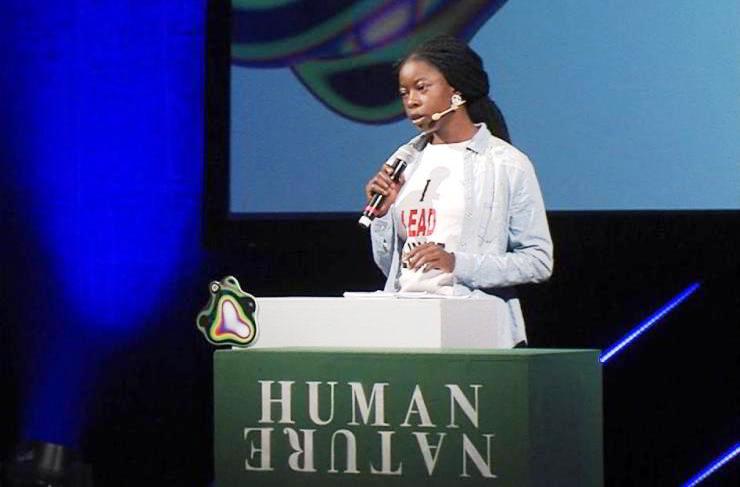Adenike Oladosu. Climate Change: Time to Act.

Nigerian ecofeminist Adenike Titilope Oladosu is the founder of I Lead Climate Action, an initiative aimed at empowering women and youth to combat climate change. Furthermore, she provides expertise on sustainable agriculture in areas where desertification directly impacts food security. We talked with her.
She has represented Nigerian youth at numerous international conferences. She participated in COP25 in Madrid (2019) and the summits that followed it up to the present day. Next November, she will be present at COP 30 in Belem (Brazil).
Adenike Oladosu studied Agricultural Economics at the Federal University of Makurdi. She began her activism in 2018 after observing how climate change was intensifying conflicts between farmers and herders in her homeland.
Her commitment to combating the climate crisis centres on protecting Lake Chad, which has lost 90% of its size since the 1960s and whose situation impacts over 40 million people across four countries. Her activism centres on teaching sustainable practices in local communities, while also emphasising the importance of ecosystems and the vital role of women in environmental struggles.
In 2019, she founded ‘I Lead Climate Action’, an initiative that not only promotes climate education but also seeks to empower women. In 2024, she was included in the prestigious BBC 100 list of inspiring and influential women from around the world.
How does climate change affect women and girls?
Climate change disproportionately affects women and girls. A clear example is access to water. In many regions, women have to walk up to six hours a day to collect water, unpaid work that prevents them from receiving an education or engaging in economic and environmental activities. Another example is the increase in child marriage.
Environmental degradation and loss of livelihoods push some families to use their daughters as a survival strategy, marrying them off for money. As a result, many girls are forced to drop out of school, losing their right to an education and to decide their own future. In addition, women often face difficulties in accessing resources and land. In many communities, they do not have the right to inherit land, which prevents them from fully participating in agricultural activities and obtaining finance.
Without land, they cannot access loans or the resources needed to grow their crops. One of the initiatives we are working on is to provide women with tools, organic fertilisers and seeds, so that they can improve their agricultural production and earn an income. By integrating their traditional knowledge with these resources, many have been able to improve their economic situation, send their children to school and become agents of change in their communities.
What role do young Africans have in the fight against climate change?
When I started the Fridays for Future movement in Nigeria, many young people realised that they could get involved in this cause and help find solutions for their communities. Young people are creating initiatives and looking for innovative solutions, becoming solar technicians, data analysts, environmentalists or sustainable agriculture specialists, exploring smart ways to reduce water use in agriculture or working with international organisations to get funding to develop climate projects in their communities. Musicians can also raise awareness through their songs. Imagine the impact if influential artists like Davido released a song about climate injustice. Young Africans have no limits in taking action against the climate crisis
How does the fight against climate change affect the economic development of African countries?
It has a direct impact. It is often thought that economic growth is only possible through the exploitation of more natural resources, but fossil fuel extraction generates significant losses due to the environmental disasters it causes.
For example, in Nigeria, floods cost us millions of dollars every year and affect agriculture every season. Many farmers work hard on their land, but when their crops are destroyed by climate disasters, their efforts are reduced to nothing and ultimately result in poverty. It is not that people do not want to work; it is that environmental factors are undermining their economic opportunities.
Taking action now is far cheaper than doing nothing. We cannot wait until 2050 or 2080 to reach carbon neutrality. Delaying climate action is a hidden way of denying the problem and shifting responsibility to future generations who did not contribute to the crisis.
We must stop prioritising short-term profits from resource exploitation and focus on sustainable solutions that strengthen our economies and protect our communities. There is also a non-economic aspect to this crisis: the loss of human lives and entire cultures. We are already seeing rising sea levels threaten sites of great cultural heritage in Africa, displacing communities and, with them, their identity and history.
How much power do social media have?
Social media has enormous power in the fight against climate change. I use them to demand concrete actions, raise awareness, push for more political action and convince young people to join the movement.
For example, I created the platform womenandcrisis.com, where I have published more than 100 articles on the climate crisis and its effects on vulnerable communities, especially women living in rural areas.
The fight against climate change is not a problem that only affects the South of the world, but everyone. The countries that have contributed the least to the crisis are the ones that suffer the most, so those with the most resources must take responsibility and contribute their share. (Photo: CC BY-SA 4.0/Dtaichwomsimlooa)
Gonzalo Vitón



